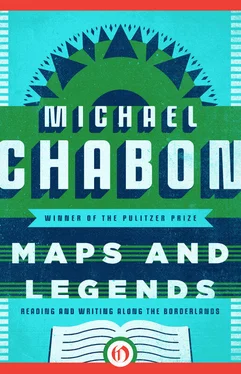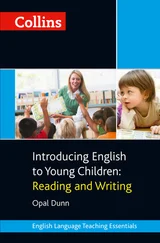To be excoriated , by the way, literally means “to have one’s skin removed”; it’s the heavy-duty version of exfoliated . Soon afterward, another angry Yiddishist came after me brandishing his loofa of outrage:
Listen up friend Chabon.* A number of us have gotten together and created a dictionary of chemistry, in Yiddish!! (I hope it will come out in a short time) … And who needs it …?? WE need it because it is our Yiddish CULTURE … for the same reason the Guide for Travelers is needed … throughout the world.…
The whole tsimmes went on more or less in this fashion, with some Mendelanyers writing to defend what I had written, and with the argument on the other side boiling down in the end mostly to this:
Of course, no one can fault him for how he feels about the issue, but it seems to me that this feeling stems at least in part from his sharing the popular but quite inaccurate opinion that Yiddish has already entered the world of Latin, Sanskrit, and Gothic.
Of course, this misses the point completely. It is not the apparent “deadness” of its language, however accurate or inaccurate such an impression may be, that makes Say It in Yiddish such a wondrous, provocative, sad, and funny book. Even if Yiddish is taken to be alive and well, Say It in Yiddish still proposes a world that never was and might have been, and makes it all feel absurdly and beautifully ordinary. But though I wrote to the membership and tried to explain myself, I had no success in diminishing the rage of Mendelyaners such as the one who declared, finally:
The “humorous” article in Civilization was not funny, but ridiculous. No, an ignorant insult to the World of Yiddish. The author of that article has already apologized to B. Weinreich.
In fact I had, after the article was published, received a very unhappy letter from Mrs. Weinreich, the widow of Uriel, who died in 1967. She viewed my essay as disrespectful and mocking not only of her late husband, who as I now learned had at his untimely death been regarded as the great young hope of Yiddish scholarship in America, but of the Yiddish language itself. And so I had written her to apologize, not for anything I said in the essay, but for any unintended appearance of mockery there might have been, and for having hurt her feelings. To this I received a not-at-all mollified reply to my reply.
Back in 1991, the reviewer of my first story collection in the New York Times Book Review criticized me for being, among a number of other things, essentially too much of a nice Jewish boy. Too polite, she lamented. Too respectful of my elders. “Mr. Chabon’s parents,” said the reviewer, Elizabeth Benedict, “may not appreciate my holding up Philip Roth as an example to their son, but Mr. Roth offers crucial lessons to this … young writer, who is so evidently eager to please… Don’t worry so much about being nice.” I supposed, at the time, that the Times reviewer had a point; and since then, I have encountered nothing that would persuade me otherwise, or that would enable me, however hard I might try, to be anything else. And as a nice Jewish boy, I experienced two competing reactions to this tsimmes over Say It in Yiddish, both of them typical if not definitive, to my mind, of my lamentable species.
On the one hand, I was, as I wrote to Mrs. Weinreich, deeply sorry. I had never been in hot water before because of something I wrote, and I found that I did not enjoy the sensation. As Elizabeth Benedict suggested, I wanted people to like me. And over and above every other kind of people whom I wanted to like me were nice old Jewish ladies like Beatrice Weinreich. Even stronger than my regret was my sense of embarrassment. Many of my Mendele critics had taken the time to “hock me a tchainik” about my ignorance of Yiddish and Yiddishkeit, and while I freely confessed to this ignorance, it is one thing to admit something and another to have it thrown in your face. The embarrassing fact was that I had never heard of Uriel Weinreich, and the reverence in which he was evidently held persuaded me that I ought to have. I felt my ignorance, and was ashamed.
My second typical nice-Jewish-boy reaction was — well, I’ll get to that in a minute.
Some time after the tsimmes cooled, Janet Hadda, a professor of Yiddish lit at UCLA and a practicing psychoanalyst, wrote a series of articles and papers in which she tried to determine just what it was about my essay that had made some people so angry. Hadda claimed that the lovers of Yiddish were in mourning over their murdered language, and hence living in denial, a stage from which, as we all know, it is but one short step to anger. there may or may not be merit to Hadda’s argument; I would prefer to leave it to the analysts and analysands to duke it out for themselves, if they care to. I was more taken by another of Hadda’s claims, namely her postulating beyond questions of death and denial a kind of survival of Yiddishkeit in the imagination of my generation of American Jewish writers, in our return to Ashkenazic and Yiddish themes and subject matter, in our evocation, perhaps half-unconscious, of the deep echoes of the mother tongue of our grandparents and great-grandparents. Hadda describes us as “born into an interrupted culture” and “try[ing] to compensate for the loss.”
The phenomenon of young writers turning to the culture of their parents for exploration is anything but rare. What is unusual, if not unique, about the culture of Ashkenaz† is that it can no longer be found today except in the memories of a very few survivors and in the imaginations of artists [italics mine].
Another phenomenon that is far from rare, of course, is that of a Jew — hell, of any human being — longing for a home that feels irretrievable yet never ceases, age after age, to beckon. Perhaps one explanation for the improbably long survival of Judaism is the fitness of one of its central images — the unending loss of Jerusalem — to our innate human talent for nostalgia, to the aetataureate delusion, our false but certain collective human memory of a Golden Age, a time when doors had no locks and a man’s word was his bond and giants walked the earth. You find an expression of the same sense of irrecoverable loss in the “Intimations of Immortality,” where the part of Jerusalem is played by Childhood, a structure that in Wordsworthian retrospect appears to have been built, like the Golden City, nearer somehow to the heart of the mystery of things. And this is where, for me, genre fiction comes into the picture. Because when you are talking, like Hadda, about lands that can be found only in the imagination, you are really speaking my language — my mamaloshen.
* This post is a literal translation, by its author, of the Yiddish original; in Yiddish the word chaver (lit., “friend”), when used as a form of address, has a number of possible shades of meaning, among them, as here, “enemy,” or “dickhead.”
† By Ashkenaz, Hadda means an actual geographical region — the lands of northern European Jewry — as much as a culture and a state of mind.
6.
I was born the first time in Georgetown University Hospital, in 1963, and the second time ten years later, in the opening pages of “A Scandal in Bohemia.” In this latter infancy the heaven that lay about me was the work of Conan Doyle, Ray Bradbury, Philip José Farmer, Jack Vance. Fantasy and science fiction, then horror and hard-boiled mystery; my passion and my ambition as a reader and a writer were forged in the smithy of genre fiction.
As a young man, an English major, and a regular participant in undergraduate fiction-writing workshops, I was taught — or perhaps in fairness it would be more accurate to say I learned — that science fiction was not serious fiction, that a writer of mystery novels might be loved but not revered, that if I meant to get serious about the art of fiction I might set a novel in Pittsburgh but never on Pluto. The Long Goodbye could be parsed by the literary critic for a class on Masculine Anxiety in the Postwar American Novel, but it was unlikely to appear on the syllabus of a general twentieth-century American literature class alongside Absalom, Absalom and the stories of Flannery O’Connor.
Читать дальше
Конец ознакомительного отрывка
Купить книгу












